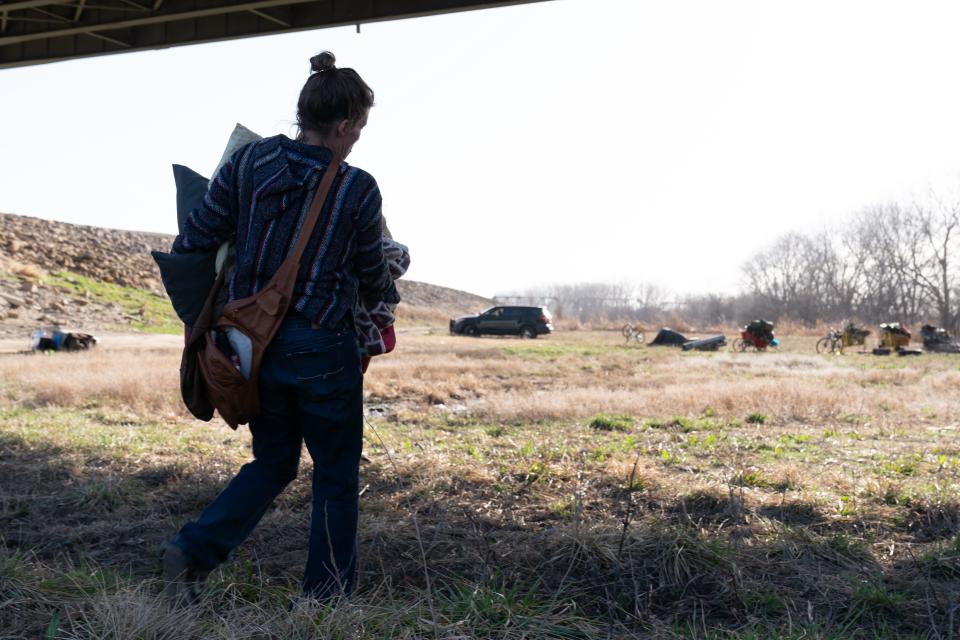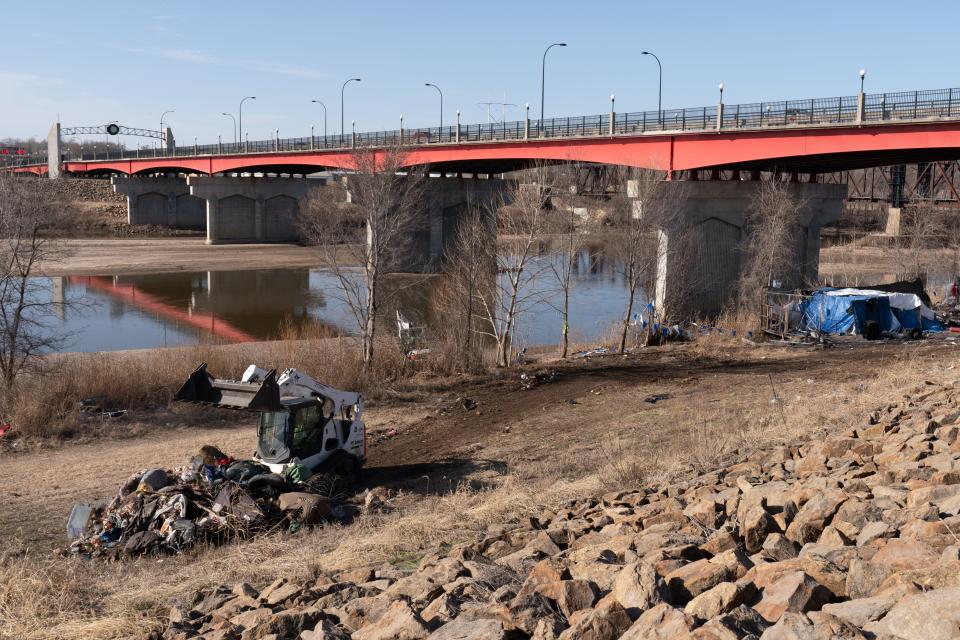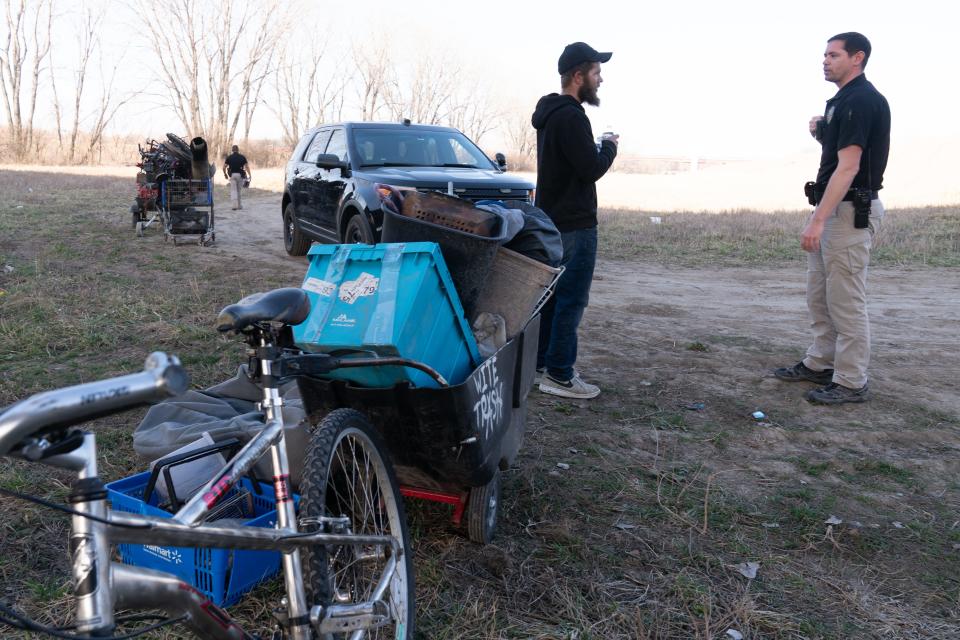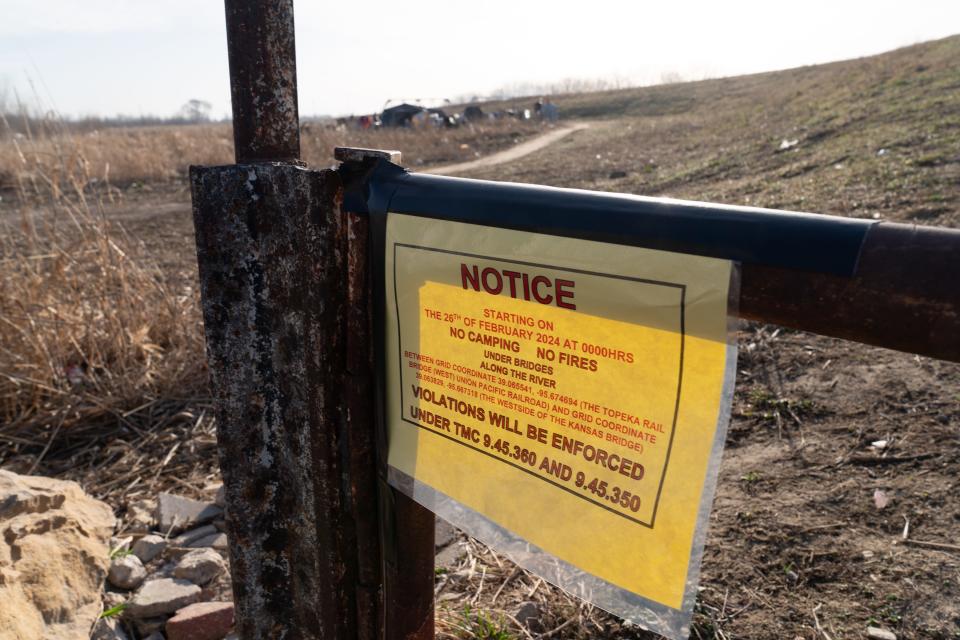Tired and heartbroken: People who are unsheltered moved from river camps in North Topeka
About 10 unsheltered residents were pushed out of their camps Tuesday morning near N. Kansas Avenue Bridge, with about 15 others moving in recent weeks.
Topeka police Maj. Michael Cross said Tuesday morning that the city and its partners had planned to remove campers, belongings and any structures that might be present from the area just north of the Kansas River between the N.W. Topeka Boulevard and N. Kansas Avenue bridges.
In the process of removing campers, some will lose their belongings, including Joe, whose last name wasn't given. After being homeless for the first time, Joe has been camping here for the past six months.
Now with the forced move, Joe is unsure where he will go next.

Joe and a handful of other campers said that while the process has been difficult, police Sgt. Mat Rose has been helpful. Joe said Rose — who supervises a police team that does outreach to people who are homeless — brought his truck before Tuesday's official cleanout and helped campers move their belongings.
Kassie Blount said she was physically tired from moving all her stuff out of her camp.
Steffany Allen said dealing with the move is heartbreaking, adding that it's (expletive).
"It's not fair," she said. "Like they took one dude to jail yesterday but then the dude next to him, they let stay there all day to finish moving his stuff. How is that fair?"
Topeka police arrested two people Monday in the area involved on outstanding warrants charging them with crimes and cited five others in connection with violating the camping ban ordinance, Nichols said.
The city and its partners with the abatement effort, in enforcing that ordinance, were giving residents time to comply with the code and often giving them additional time if they had made improvements, she said.
Has the city of Topeka moved homeless camps before?
Tuesday marked at least the fourth time in recent years that people who are unsheltered have been removed from campsites just north of the Kansas River in North Topeka.
The city's Homeless Task Force in March 2020 evicted dozens of residents who are homeless from their camps located on railroad-owned properties in the area adjacent to N.E. Curtis Street. The move came at the request of the owners, Union Pacific Railroad and BNSF Railway.
The city in April 2022 and May 2022 bulldozed a North Topeka area known as Tent City while removing about 30 people, including many of the same residents displaced in 2020.
Though the city since 2019 has banned camping in certain, specific areas, Tent City didn't appear to be among those. City officials said it was bulldozed in 2022 for health and safety reasons.
Why was campsite for unsheltered residents removed?
Topeka's mayor and city council voted 9-0 last September to expand the city's ordinance that makes it a crime to camp in certain, specific places.
It banned camping — with limited exceptions — on public and private property within 500 feet of the centerline of any trail, including trails on levees running alongside the Kansas River.

For various reasons, interim city manager Richard U. Nienstedt had since put off initiating enforcement of the ordinance.
But Cross, the police major, said the police department's property maintenance unit about two months ago observed that sanitation levels in several of the camps in the area involved had made them unsafe and unfit for human habitation.
"What we're doing is a sanitation abatement that happened to coincide and really play along well with the newly adopted Topeka city ordinance on illegal camping," Cross said.
City officials have decided going forward that as they conduct any future sanitation abatements in the area, they'll clear the campsites, mark them and prohibit future habitation in those areas, Cross said.
Tuesday's abatement action was also aimed at preventing potential damage to the levee, Cross said.
Residents had brought in construction materials to build makeshift structures, which might potentially damage the levee and harm city flood control efforts, he said.
City officials have decided going forward that as they conduct sanitation abatements, they're going to clear those area, post them, mark them and prohibit future habitation in those area, Cross said.

City officials also worried about possible damage to the levee from the nearby campsites.
"These aren't just tents," Cross said.
What steps preceded Tuesday's evictions?
Nichols said the city was taking a "people-first" approach to enforcing the camping ban ordinance.
The city's property maintenance unit makes that a standard practice, Nichols said, adding that the city first notifies residents that they are out of compliance, gives them time to comply, often gives them more time if they have made improvements, then follows up with enforcement, if needed.
Signs were placed recently at homeless camps located north of the Kansas River between the city's N.W. Topeka Boulevard and N. Kansas Avenue bridges, Nichols said.

Cross said police and others from the community have been working with those in the area involved for six weeks, letting them know the area will be cleared and asking how the can help.
Last week, Cross said, officers unlocked levee gates to allow service organizations to bring trucks into the area to help residents load their belongings so they can be moved elsewhere.
"These are people, too," Cross said "We wanted to make sure they were afforded that opportunity, that if something was valuable to them and this was their home, they were given the opportunity to gather their possessions and get out of here in time."
Cross said the number of people in the area involved was originally estimated at 25, but had gotten down to "eight or 10" as of last week.
Those signs provide basic information about the ban that applies to the campsites, she said.
Those taking part in the abatement process include TRM Ministries, the Topeka Police Department and the city's water pollution control division, property maintenance unit, public works department and housing division, Nichols said.
TRM, a faith-based organization, since 1953 has served homeless, hungry and impoverished citizens in the Topeka community, including by offering shelters for people who are homeless.
Contact Tim Hrenchir at 785-213-5934 or threnchir@gannett.com and Stacey Saldanha-Olson at solson@gannett.com.
This article originally appeared on Topeka Capital-Journal: People who are unsheltered moved from river camps in North Topeka

